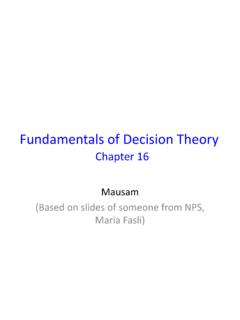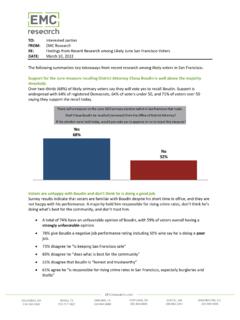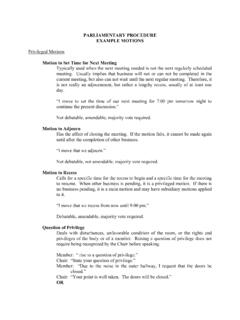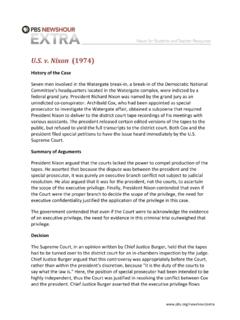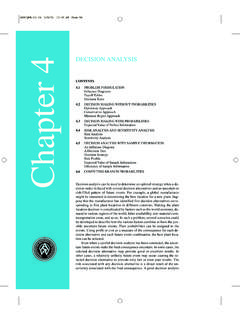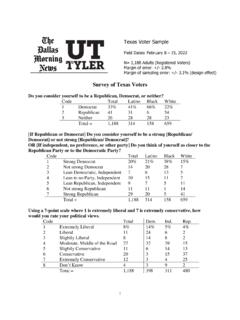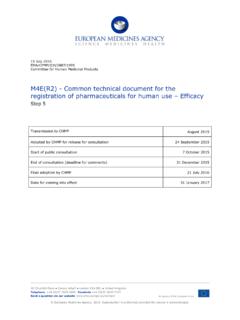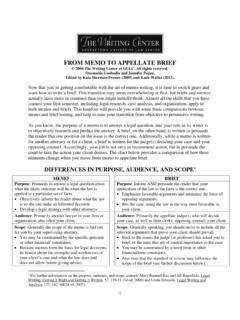Transcription of 'Dealing with absent and unfavorable witnesses in the ...
1 "Dealing with absent and unfavourable witnesses in the Local Court" By Tom Quilter ALS annual conference Sydney, July 2008 CONTENTS PART 1: absent witnesses 3 1. Adjournments 3 2. Warrants 5 3. Tendering the statement of the absent witness 7 Is the witness unavailable? 8 Was the statement made in trustworthy circumstances? 11 Section 65 procedure 14 Notice provisions: s 67 14 Discretionary Exclusion: s 137 14 Consequences of allowing the evidence 15 4. What if my client is also absent ? 16 PART 2: UNFAVOURABLE witnesses 17 1. Examination-in-chief 17 Refreshing memory in court: s 32 18 2. Cross-examination: s 38 19 Prior inconsistent statements 19 Notice 20 Unfairness to the accused: s 192 20 The ambit of cross-examination 21 Certificates for protection against self-incrimination: s128 21 Section 38(1)(a) and (b) 22 The effect of granting leave to cross-examine 22 Complying with the rule in Browne v Dunn 24 3.
2 Tendering the written statement of the witness 24 Proving the statement was made 24 Proving what was said in the statement 25 4. Considering closing arguments 26 3 INTRODUCTION Advocacy books are a useful resource for preparing defended hearings. This is because they provide some advice for cross-examining prosecution witnesses . However, in a significant number of cases, the main prosecution witness does not attend. And if he or she does, the only person cross-examining the witness is the prosecutor. The advice from the advocacy books is largely irrelevant. The purpose of this paper is to provide lawyers with some guidance when encountering these cases. There are a number of papers that discuss the ethical challenges for lawyers in these situations. The focus of this paper is law and legal procedure.
3 The intended audience of the paper is junior solicitors working for the ALS in local courts. The paper is in two parts. Part 1 deals with absent witnesses . Part 2 deals with unfavourable witnesses . PART 1: absent witnesses When a prosecution witness fails to attend a hearing, a prosecutor may do the following: 1) request that the hearing be adjourned to another date to allow the witness to attend. 2) apply for a warrant for the arrest of the witness 3) proceed by tendering the statement of the absent witness I will now discuss the legal principles and procedure concerning these three processes. 1) Adjournments Legal Principles Prosecutors nearly always seek an adjournment when one of their witnesses fails to attend a hearing. This is especially so when they cannot establish a prima facie case without the missing witness.
4 A magistrate has the power to adjourn a matter on the day of This decision is wholly within the discretion of the Therefore an 1 Criminal Procedure Act 1986 NSW s 40 (1); Local Courts Act 1982 s 54 2 R v Callaghan [1966] VR 17 cited in Howie & Johnson Annotated Criminal Legislation NSW, Butterworths 2007. 4 appellate court will only interfere with such a decision if the Magistrate has erred in exercising that discretion or not exercised his/her discretion at The magistrate s decision involves weighing up the accused s right to hear charges without delay against the prosecution s right to present its Magistrates may also have regard to efficient case management (however this is subordinate to the aforementioned considerations).5 Factors relevant to this decision include:6 Whether the application is opposed7 The reason why the prosecution cannot proceed8 The likelihood of the witness attending on the next occasion The effect of refusing the adjournment on the prosecution case9 The gravity of the charge10 Whether the accused is in custody11 Age of the matter12 Cost to the defendant (including whether the defendant received prior notification of the application13) One case on this issue is DPP v Gursel Ozakca & Anor [2006] NSWSC 1425.
5 This was a crown appeal against a magistrate s refusal to grant an adjournment. It was a domestic violence matter. The complainant failed to attend. Without the complainant s evidence, a prima facie case could not be established and the charges were dismissed. The complainant had gone to Turkey to visit her father, who was suffering from a heart condition. The illness was unexpected and it was impossible for her to return by the hearing date. Rothman J held that due to these exceptional circumstances, and because the adjournment application was never opposed, the accused right to a speedy trial did not outweigh the prosecutor s right to properly present its case. The magistrate s order was quashed and the matter was remitted to the local court for hearing. Rothman J said it is an essential aspect of the discretion that I exercise in quashing the orders that the accused is not, and was not, in custody.
6 14 3 In DPP v Gursel Ozakca & Anor [2006] NSWSC 1425 it was held that the failure to grant an adjournment meant the prosecutor was denied natural justice. This meant that the magistrate had constructively failed to exercise his jurisdiction. 4 Ozarkca above at [19]. 5 Queensland v JL Holdings Pty Limited [1997] HCA 1; (1997) 189 CLR 146 at 154, per Dawson, Gaudron and McHugh JJ. 6 This is not an exhaustive list. 7 Ozarkca at [26]. 8 A medical emergency would be a good reason. 9 Smith v Attard (NSWSC, Studdert J, 8 November 1993, unreported) at 5. 10 Smith v Attard (NSWSC, Studdert J, 8 November 1993, unreported) at 5. 11 Ozarkca at [30]. 12 Smith v Attard (NSWSC, Studdert J, 8 November 1993, unreported) at 5. 13 Ozarkca [26]. 14 Ozarkca [30].
7 5 It is very important to emphasise that the decision in Ozarkca was dictated by the presence of exceptional circumstances. Procedure Magistrates will usually determine applications by hearing submissions from the bar table. Some magistrates might insist on oral evidence from the informant to explain why the prosecution are not ready to proceed. On these occasions, defence lawyers will have an opportunity to cross-examine the informant. But bear in mind that highlighting tardy police work may lead a magistrate to reason why should the complainant miss out on his/her day in court just because the police never even told him/her the court date. The police fact sheet will normally be tendered on the adjournment application to enable the magistrate to assess the gravity of the charge. Defence lawyers will normally be instructed by their clients to oppose the application, however, this may not impress the magistrate if the prosecutor has presented truly exceptional circumstances.
8 Addressing the bullet points above will assist in opposing applications. If important factors are unknown, such as the reason for the witness s absence, it may be worth pointing out that the prosecutor is the applicant and it is for them to convince the court that an adjournment is appropriate. If the adjournment is granted because of a witness non-attendance, it would seem a magistrate should hear any fresh bail 2) Warrants If the prosecutor is successful in obtaining an adjournment, they may also request a warrant to ensure the attendance of a witness. Some magistrates will consider the issue of a warrant before determining the adjournment application (these magistrates would argue that unless there s a warrant there is no point adjourning the matter.) Magistrates have the power to issue a warrant for the arrest of an absent However, a magistrate can only do this if: a subpoena was issued for the witness s attendance; and all requirements (see below) for subpoenas were complied with; and the witness has not complied with the subpoena; and no just or reasonable excuse has been offered for the failure to comply17 15 s 22A of the Bail Act 1978 NSW should not preclude an application in these circumstances.
9 16 Criminal Procedure Act NSW 1986 s 229 17 Note that this criterion is less onerous on the prosecutor than section 194 of the Evidence Act which requires the party seeking the warrant to actually prove that the non-attendance is without excuse. It appears section 194 of the Evidence Act has been abrogated by Criminal Procedure Act s229. This means 6 Requirements for subpoenas include: they must be signed and dated by a Registrar18 they must be served within a reasonable time and at least 5 days before the hearing19 unless a Registrar has permitted the subpoena to be served The police may serve a witness with a subpoena by:21 - handing it to the witness - sending it by post, fax or email to the witness business address/business email address - putting it down in the witness presence if the witness is refusing to accept it (after telling them the nature of the notice) Unlike civilians, the police do not appear to have a statutory requirement to pay conduct money when subpoenaing When warrants are issued, hearings are normally adjourned for mention to fix a new hearing date.
10 The mention date is normally a week or two after the original hearing date. This allows the police to execute the warrant. The witness is normally granted bail usually with a bail condition to attend the new hearing date. The court often invites a defence lawyer to make submissions opposing the warrant. If the adjournment application has already been granted it is difficult to see how a defence lawyer has standing on this issue ( why should the defendant care if the witness is arrested or not before the next hearing date?). Notwithstanding that, if the foundation for a warrant has not been established, lawyers should draw this to the court s attention. If the warrant is considered before the adjournment has been granted, defence lawyers should be entitled to address the court. This is because the decision to issue a warrant would undoubtedly affect the decision to adjourn the matter ( a magistrate is unlikely to issue a warrant and then refuse the adjournment.)

